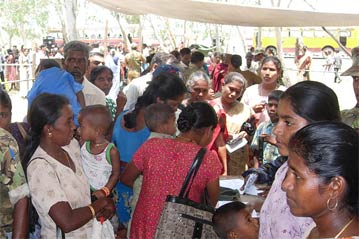UNHCR helps government start return of 90,000 IDPs to Batticaloa district
UNHCR helps government start return of 90,000 IDPs to Batticaloa district

COLOMBO, Sri Lanka, May 15 (UNHCR) - The government has launched a programme to return tens of thousands of displaced people to their homes in an area of eastern Sri Lanka that was under rebel control until recently.
The process began on Monday when the government provided buses to take some 3,000 displaced people back to their homes in West Batticaloa district. The authorities plan to return more than 90,000 people from other areas of Batticaloa over the coming months. They were displaced after heavy fighting between government forces and the Liberation Tigers of Tamil Eelam (LTTE) in February.
UNHCR monitors said most people seen on Monday were eager to return home under the voluntary programme. "However, we do caution that attention should be given to categories of people with special needs and urge the government to continue the step-by-step phased approach, upholding international protection standards and ensuring that return will continue to be voluntary," Amin Awad, UNHCR's representative in Colombo, said at Monday's launch.
The UN refugee agency will monitor the operation and report directly to the government on any problems regarding the voluntary nature of the returns and any deviation from the civilian characteristics of the move.
Starting Wednesday, UN agencies will be given full access to West Batticaloa to provide support to the returnees. UNHCR on Tuesday urged the government to speed up access for other international aid agencies to villages in West Batticaloa so they can carry out assistance programmes aimed at reintegration and sustaining return.
The return to West Batticaloa is planned to take place in three phases. Under the initial phase, more than 34,000 people will be transported by bus to their villages of origin in the southern part of West Batticaloa in the next two weeks.
Local government officials are registering the returnees and issuing them with identity documents to ensure freedom of movement. Dry rations are also provided by the government for one week at the point of departure and a one month ration will be made available on return to the villages.
A UN advance team, including UNHCR, carried out a preliminary joint assessment of West Batticaloa. It seems that the conflict has had a relatively low level of impact in the area.
UNHCR's Awad, who also discussed return and reintegration plans with government officials in Batticaloa, stressed the need for a more comprehensive understanding of what kind of assistance is required in the return areas to help restore essential services and boost livelihood opportunities.
UNHCR, together with its partners, is looking at possible reintegration packages and is calling on the international community to help with assistance, as well as asking the government to expedite its own rehabilitation plan for the return areas.








